人教版初中英语七年级英语上下册笔记
- 格式:doc
- 大小:144.00 KB
- 文档页数:15
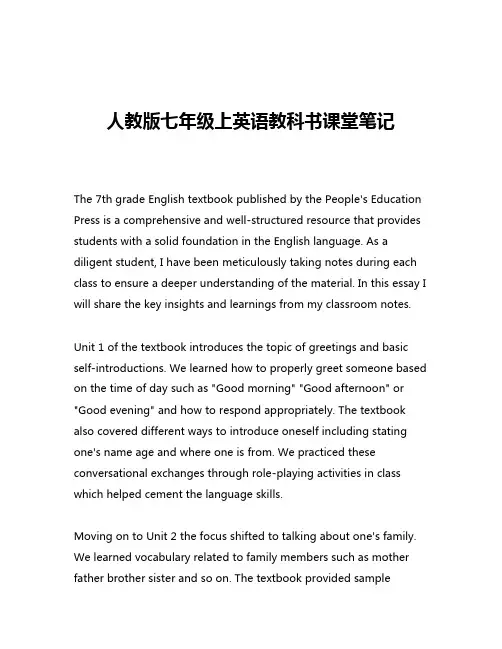
人教版七年级上英语教科书课堂笔记The 7th grade English textbook published by the People's Education Press is a comprehensive and well-structured resource that provides students with a solid foundation in the English language. As a diligent student, I have been meticulously taking notes during each class to ensure a deeper understanding of the material. In this essay I will share the key insights and learnings from my classroom notes.Unit 1 of the textbook introduces the topic of greetings and basic self-introductions. We learned how to properly greet someone based on the time of day such as "Good morning" "Good afternoon" or "Good evening" and how to respond appropriately. The textbook also covered different ways to introduce oneself including stating one's name age and where one is from. We practiced these conversational exchanges through role-playing activities in class which helped cement the language skills.Moving on to Unit 2 the focus shifted to talking about one's family. We learned vocabulary related to family members such as mother father brother sister and so on. The textbook provided sampledialogues demonstrating how to ask about and describe one's family. We were encouraged to share information about our own families during class discussions which was a great way to apply the language in a personalized context. Additionally the unit touched on cultural differences in family structures across different countries.Unit 3 dealt with the theme of daily routines. We expanded our knowledge of verb tenses particularly the simple present tense which is crucial for describing habitual actions. The textbook presented common daily activities like waking up eating breakfast going to school doing homework and going to bed. We practiced forming sentences to describe our personal daily routines and also learned to ask questions about others' daily lives. Understanding daily routine vocabulary and sentence structures laid an important groundwork for more complex conversational skills.In Unit 4 the topic was about likes and dislikes. We learned adjectives to express preferences such as "like" "love" "enjoy" "hate" and "dislike" as well as sentence structures for stating what one likes or doesn't like. The textbook included examples of people discussing their hobbies interests and favorite things. During class discussions we shared our own likes and dislikes and discovered commonalities and differences amongst our preferences.Unit 5 focused on the theme of weather and seasons. We expandedour vocabulary to describe different weather conditions such as sunny cloudy rainy snowy windy and so on. The textbook provided sample dialogues of people commenting on the weather and discussing their favorite seasons. We practiced having conversations about the weather and learned to ask questions to gather information. Understanding weather vocabulary was particularly useful for discussing plans and activities.In Unit 6 the topic shifted to talking about one's school life. We learned words and phrases related to school subjects classroom items daily schedules and extracurricular activities. The textbook presented dialogues of students introducing their schools and talking about their class schedules and favorite subjects. During class we shared information about our own schools and class routines which allowed us to apply the language in a personalized way.Unit 7 dealt with the theme of shopping. We were introduced to vocabulary for different types of stores and products as well as useful phrases for making inquiries and transactions. The textbook included sample conversations of people going shopping and negotiating prices. We practiced role-playing shopping scenarios in class which helped us become more comfortable with the language needed for real-world shopping experiences.The 8th unit focused on the topic of travel and transportation. Weexpanded our knowledge of vocabulary related to different modes of transportation such as bus train airplane and so on. The textbook provided examples of people discussing their travel plans and experiences. We also learned phrases for asking for and giving directions. Being able to communicate about travel was a valuable skill given the increasing globalization and need for cross-cultural exchange.Throughout the textbook the content was not only informative but also engaging. The language structures and vocabulary were introduced in a logical and scaffolded manner allowing us to build upon our knowledge incrementally. The textbook also incorporated a variety of interactive activities such as pair work small group discussions and presentations which made the learning process more dynamic and effective.Beyond the core content the 7th grade English textbook also included elements that fostered cross-cultural understanding. For example there were sections that highlighted cultural traditions and customs from English-speaking countries. This expanded our horizons and allowed us to appreciate the diversity of the global community.Overall the 7th grade English textbook published by the People's Education Press has been an invaluable resource for my languagelearning journey. The comprehensive coverage of essential topics the scaffolded skill-building and the interactive learning activities have all contributed to strengthening my English proficiency. As I continue my studies I will continue to refer back to my detailed classroom notes to reinforce the knowledge and skills gained from this exceptional textbook.。

1.hard-working“勤勉的,努力工作的"作定语work hard动副结构短语2.be patient with sb.“对某人有耐心“3.take(one’s)time to do sth.“花费时间做某事”It takes sb.some time to do sth.=sb.spend some time on sth./(in)doing sth.“做某事需花费……时间”4.like doing sth.“喜欢做某事”(表喜欢、爱好某种经常的或习惯性的活动)like to do sth.“喜欢去做”(表喜欢、爱好某种特定的或具体的活动)Eg.I like visiting friends on Sundays and I like to visit Tom this Sunday.like sb.to do sth.“喜欢某人做某事”Eg.We all like him to play the guitarlike介词Eg.She looks like her father.5.witha.同,与,和talk with a friendb.用(工具、手段)cut meat with a knifec.在……身边(随身携带)Do you have any money with you?Take an umbrella with you?d.以……,带着……She often talks with smile.6.always频率副词“总是”be动词或助动词之后,行为动词之前Eg.Our teacher is always kind to us.“一直;(将)永远;老是(用于进行时)”Eg.I will always remember your words.She is always moving things around.He has always been the tutor.always>usually>often 7.probablyadv.“大概;很可能”;adj.“可能的,大概”Eg.I’ll probably be a doctor in the future.It is probable to finish the job before dark.8.in the world世界上all over the world=throughout the world全世界9.never adv.是ever的否定形式,用于加强否定语气。
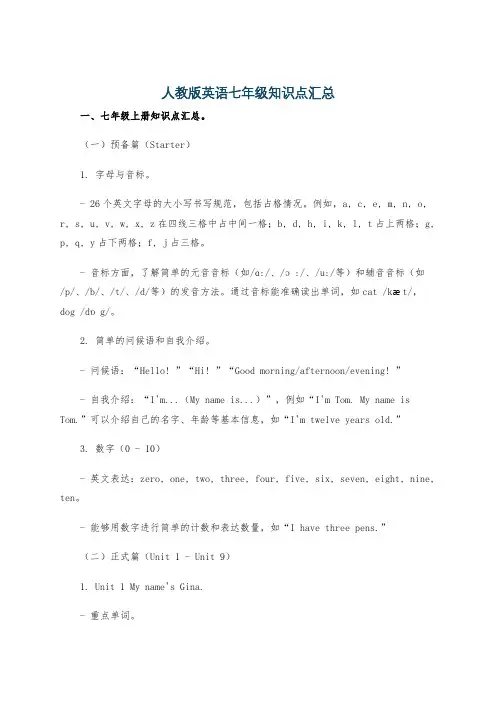
人教版英语七年级知识点汇总一、七年级上册知识点汇总。
(一)预备篇(Starter)1. 字母与音标。
- 26个英文字母的大小写书写规范,包括占格情况。
例如,a, c, e, m, n, o, r, s, u, v, w, x, z在四线三格中占中间一格;b, d, h, i, k, l, t占上两格;g, p, q, y占下两格;f, j占三格。
- 音标方面,了解简单的元音音标(如/ɑ:/、/ɔ:/、/u:/等)和辅音音标(如/p/、/b/、/t/、/d/等)的发音方法。
通过音标能准确读出单词,如cat /kæt/,dog /dɒg/。
2. 简单的问候语和自我介绍。
- 问候语:“Hello! ”“Hi! ”“Good morning/afternoon/evening! ”- 自我介绍:“I'm...(My name is...)”,例如“I'm Tom. My name is Tom.”可以介绍自己的名字、年龄等基本信息,如“I'm twelve years old.”3. 数字(0 - 10)- 英文表达:zero, one, two, three, four, five, six, seven, eight, nine, ten。
- 能够用数字进行简单的计数和表达数量,如“I have three pens.”(二)正式篇(Unit 1 - Unit 9)1. Unit 1 My name's Gina.- 重点单词。
- name(名字),nice(美好的),to(不定式符号,无实义),meet(遇见),too(也),your(你的;你们的),his(他的),her(她的)。
- 重点句型。
- “What's your name? ”“My name's...(I'm...)”用于询问和回答名字。
- “Nice to meet you. ”“Nice to meet you, too.”用于初次见面时的问候。
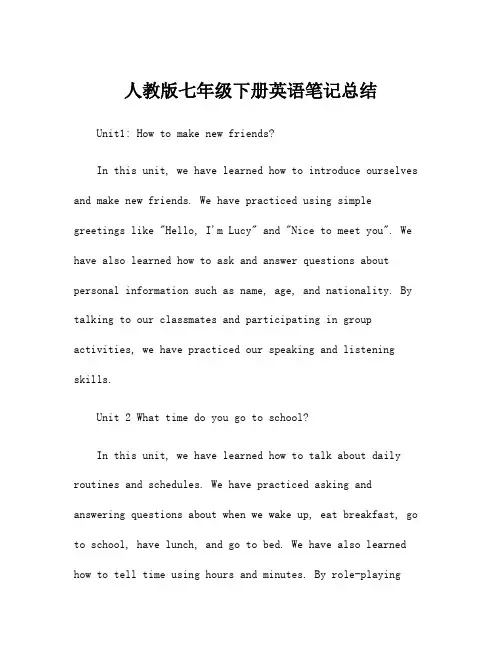
人教版七年级下册英语笔记总结Unit1: How to make new friends?In this unit, we have learned how to introduce ourselves and make new friends. We have practiced using simple greetings like "Hello, I'm Lucy" and "Nice to meet you". We have also learned how to ask and answer questions about personal information such as name, age, and nationality. By talking to our classmates and participating in group activities, we have practiced our speaking and listening skills.Unit 2 What time do you go to school?In this unit, we have learned how to talk about daily routines and schedules. We have practiced asking and answering questions about when we wake up, eat breakfast, go to school, have lunch, and go to bed. We have also learned how to tell time using hours and minutes. By role-playingdifferent scenarios and working on exercises in our textbook, we have improved our vocabulary related to time and routines.Unit 3 I’m more outgoing than my sisterIn this unit, we have learned how to compare and describe people's personalities. We have practiced using comparative and superlative adjectives to talk about different characteristics like outgoing, friendly, and creative. We have also learned how to express preferences and opinions using phrases such as "I think" and "In my opinion". By discussing our own personalities and those of others, we have developed our ability to express ourselves clearly and eloquently.Unit 4 He said I was hardworkingIn this unit, we have learned how to talk about past events and describe what people said. We have practiced using reported speech to recount conversations and statements made by others. We have also learned how to form and use reportedspeech with different tenses like present simple, past simple, and present continuous. By listening to recordings and watching videos, we have improved our ability to understand and communicate in English.Unit 5 Do you want to watch a game show?In this unit, we have learned how to talk about TV programs and preferences. We have practiced using modal verbs like "want", "like", and "prefer" to express desires and choices. We have also learned vocabulary related to different types of TV shows such as game shows, documentaries, and sitcoms. By discussing our favorite programs and explaining why we like them, we have expanded our knowledge of media and entertainment.Unit 6 I’m watching TVIn this unit, we have learned how to talk about present actions and habits. We have practiced using presentcontinuous to describe activities happening now, as well aspresent simple to talk about routines and habits. We have also learned how to use adverbs of frequency like "always", "often", and "sometimes". By sharing our daily activities and discussing our interests, we have developed our ability to communicate effectively in English.Overall, this semester has been a rewarding and enriching experience. We have made progress in our language skills and expanded our vocabulary. We have also learned about different cultures and ways of life through our English studies. I look forward to continuing to improve my English in the future and using it to connect with people from around the world.。
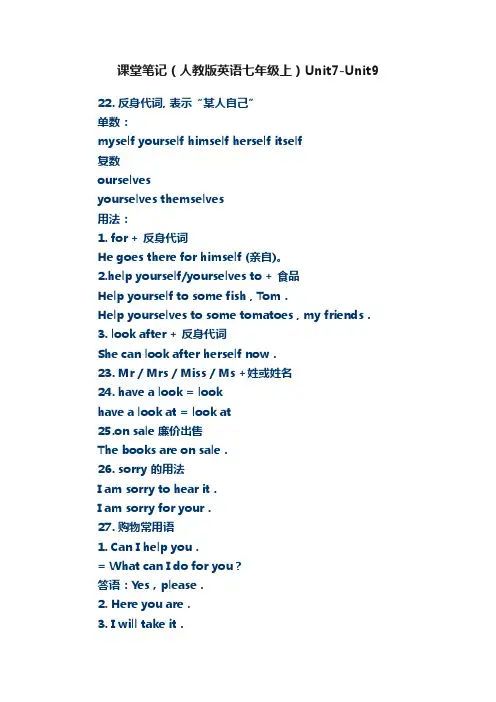
课堂笔记(人教版英语七年级上)Unit7-Unit922. 反身代词, 表示“某人自己”单数:myself yourself himself herself itself复数ourselvesyourselves themselves用法:1. for + 反身代词He goes there for himself (亲自)。
2.help yourself/yourselves to + 食品Help yourself to some fish , Tom .Help yourselves to some tomatoes , my friends .3. look after + 反身代词She can look after herself now .23. Mr / Mrs / Miss / Ms +姓或姓名24. have a look = lookhave a look at = look at25.on sale 廉价出售The books are on sale .26. sorry 的用法I am sorry to hear it .I am sorry for your .27. 购物常用语1. Can I help you .= What can I do for you ?答语:Yes,please .2. Here you are .3. I will take it .= I will have it .= I will buy it .28 . 一般将来时态:表示将来的动作或状态。
构成:助动词will+动词原形。
时间状语:将来时间next week / month / year , tomorrow 等。
句型变化:将来型He will study English .否定He won’t study English .一般疑问句 Will he study English ?回答: Yes,he will ;No, he won’t .特殊疑问句What will he study ?29. 几个重要介词1. atHe buys a T-shirt at Huaxing’s great sale. They have pants at a very good price .2. forA . 表示“交换的价格”He has pants for only ¥50 .B. 表示“对某人来讲”For me , I will study hard .C . for + 反身代词We will go there for ourselves next week .3. inA.在---内部My pen is in the desk .B . in +颜色I have bags in red .= I have red bags . She is in red .=She wears red clothes . Unit8单词1. 一年12月份JanuaryFebruaryMarchAprilMayJuneJulyAugustSeptemberOctoberNovember December2. 一周的七天SundayMondayTuesdayWednesday ThursdayFridaySaturday3. 一年四季springsummerautumn / fallwinter语法A.数词的分类基数词:表示数量序数词:表示顺序A . 1 one first2 two second3 three third4 four fourth5 five fifth6 six sixth7 seven seventh8 eight eighth9 nine ninth10 ten tenthB . 11 eleven eleventh12 twelve twelfth13 thirteen thirteenth14 fourteen fourteenth15 fifteen fifteenth16 sixteen sixteenth17 seventeen seventeenth18 eighteen eighteenth19 nineteen nineteenthC. 20 twenty twentieth30 thirty thirtieth40 forty fortieth50 fifty fiftieth60 sixty sixtieth70 seventy seventieth80 eighty eightieth90 ninety ninetieth100 hundred hundredthD . 几十几23 twenty-threetwenty-thirdB.when 引起的特殊疑问句1. His birthday is on Jan.2nd .When is his birthday ?2.Their parties is on Sunday .When are their parties ?3.The students go to school on Monday . When do the students go to school ?4.She can go home in the afternoon.When can she go home ?5.Mary does her homework in the evening . When does Mary do her homework ?6.They will have a parents’ meeting this Friday. When will they have a parents’ meeting ?when 与 what time 的区别:when 笼统时间what time 具体时刻1.He watches TV in the evening .When does he watch TV ?2. They watch the game at 8 o’clock .What time do they watch the game ?C. 提问“星期”和“日期”1. It’s Monday today .What day is it today ?2. It’s Feb.3rd today . What’s the date today ?词汇知识1.birthday(复) birthdays2. monthmouthmouse3.happy (同义) glad , pleased (反义) unhappy sad4.Happy birthday to you ! (答语) Thanks 或 Thank you .5.old (反义) new , young6.speech (复数) speeches7.party (复数) parties8.演讲比赛speech contest9.一件艺术品an art10.一堂美术课an art lesson / class11.Chinese:汉语;中国人用汉语 in Chinese中国 China三个中国人three Chinese一位汉语老师/课a Chinese teacher/ lesson / class Chinese(复数) Chinese Japanese(复数) Japanese12.听音乐listen to music13.她13岁了。
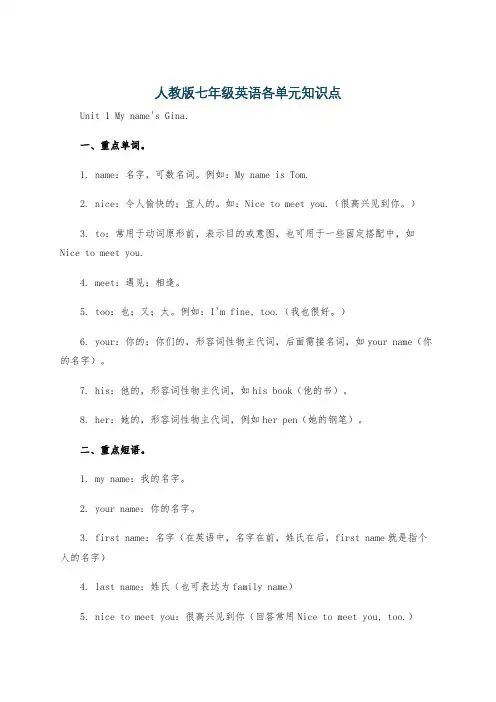
人教版七年级英语各单元知识点Unit 1 My name's Gina.一、重点单词。
1. name:名字,可数名词。
例如:My name is Tom.2. nice:令人愉快的;宜人的。
如:Nice to meet you.(很高兴见到你。
)3. to:常用于动词原形前,表示目的或意图,也可用于一些固定搭配中,如Nice to meet you.4. meet:遇见;相逢。
5. too:也;又;太。
例如:I'm fine, too.(我也很好。
)6. your:你的;你们的,形容词性物主代词,后面需接名词,如your name(你的名字)。
7. his:他的,形容词性物主代词,如his book(他的书)。
8. her:她的,形容词性物主代词,例如her pen(她的钢笔)。
二、重点短语。
1. my name:我的名字。
2. your name:你的名字。
3. first name:名字(在英语中,名字在前,姓氏在后,first name就是指个人的名字)4. last name:姓氏(也可表达为family name)5. nice to meet you:很高兴见到你(回答常用Nice to meet you, too.)三、重点句型。
1. —What's your name?(你叫什么名字?)—My name's Gina.(我的名字是吉娜。
)2. —Nice to meet you.(很高兴见到你。
)—Nice to meet you, too.(我也很高兴见到你。
)3. —What's his name?(他叫什么名字?)—His name's Tom.(他的名字是汤姆。
)4. —What's her name?(她叫什么名字?)—Her name's Mary.(她的名字是玛丽。
)Unit 2 This is my sister.一、重点单词。
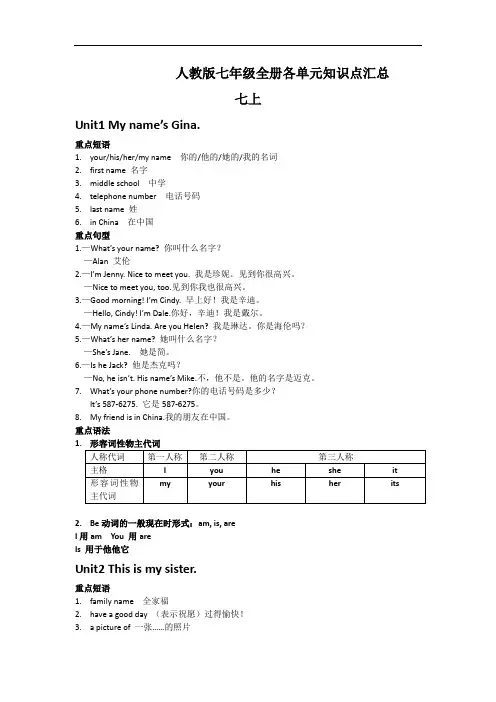
人教版七年级全册各单元知识点汇总七上Unit1 My name’s Gina.重点短语1.your/his/her/my name 你的/他的/她的/我的名词2.first name 名字3.middle school 中学4.telephone number 电话号码st name 姓6.in China 在中国重点句型1.—What’s your name? 你叫什么名字?—Alan 艾伦2.—I’m Jenny. Nice to meet you. 我是珍妮。
见到你很高兴。
—Nice to meet you, too.见到你我也很高兴。
3.—Good morning! I’m Cindy. 早上好!我是辛迪。
—Hello, Cindy! I’m Dale.你好,辛迪!我是戴尔。
4.—My name’s Linda. Are you Helen? 我是琳达。
你是海伦吗?5.—What’s her name? 她叫什么名字?—She’s Jane. 她是简。
6.—Is he Jack? 他是杰克吗?—No, he isn’t. His name’s Mike.不,他不是。
他的名字是迈克。
7.What’s your phone number?你的电话号码是多少?It’s 587-6275. 它是587-6275。
8.My friend is in China.我的朋友在中国。
重点语法1.2.Be动词的一般现在时形式:am, is, areI用am You 用areIs 用于他他它Unit2 This is my sister.重点短语1.family name 全家福2.have a good day (表示祝愿)过得愉快!3. a picture of 一张……的照片4.in the first phone 在第一张照片里5.family tree 家庭关系图6.the name of…………的名字重点句型1.That’s my family. Those are my parents. 那是我的家人,那是我的妹妹。
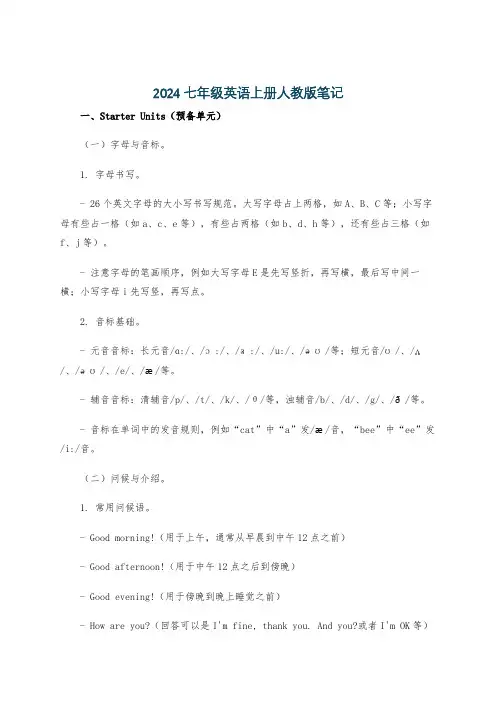
2024七年级英语上册人教版笔记一、Starter Units(预备单元)(一)字母与音标。
1. 字母书写。
- 26个英文字母的大小写书写规范。
大写字母占上两格,如A、B、C等;小写字母有些占一格(如a、c、e等),有些占两格(如b、d、h等),还有些占三格(如f、j等)。
- 注意字母的笔画顺序,例如大写字母E是先写竖折,再写横,最后写中间一横;小写字母i先写竖,再写点。
2. 音标基础。
- 元音音标:长元音/ɑ:/、/ɔ:/、/ɜ:/、/u:/、/əʊ/等;短元音/ʊ/、/ʌ/、/əʊ/、/e/、/æ/等。
- 辅音音标:清辅音/p/、/t/、/k/、/θ/等,浊辅音/b/、/d/、/g/、/ð/等。
- 音标在单词中的发音规则,例如“cat”中“a”发/æ/音,“bee”中“ee”发/i:/音。
(二)问候与介绍。
1. 常用问候语。
- Good morning!(用于上午,通常从早晨到中午12点之前)- Good afternoon!(用于中午12点之后到傍晚)- Good evening!(用于傍晚到晚上睡觉之前)- How are you?(回答可以是I'm fine, thank you. And you?或者I'm OK等)2. 自我介绍。
- My name's...(例如My name's Tom.)- I'm...(I'm a student.)二、Unit 1 My name's Gina.(一)重点单词。
1. name.- 名词,名字。
例如:What's your name?2. nice.3. to.- 在这里是不定式符号,如Nice to meet you中的to;也可作介词,表示“到……”,例如go to school。
4. meet.- 动词,遇见;会面。
例如:Nice to meet you.5. too.- 副词,也;太。
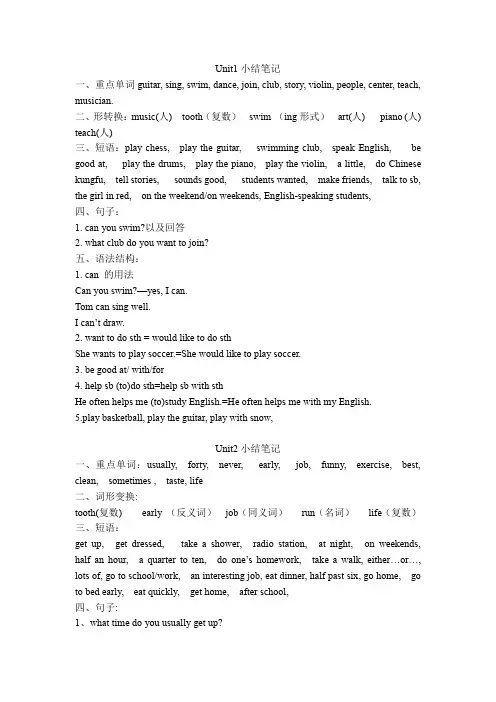
Unit1小结笔记一、重点单词guitar, sing, swim, dance, join, club, story, violin, people, center, teach, musician.二、形转换:music(人) tooth(复数)swim (ing形式)art(人) piano (人) teach(人)三、短语:play chess, play the guitar, swimming club, speak English, be good at, play the drums, play the piano, play the violin, a little, do Chinese kungfu, tell stories, sounds good, students wanted, make friends, talk to sb, the girl in red, on the weekend/on weekends, English-speaking students,四、句子:1. can you swim?以及回答2. what club do you want to join?五、语法结构:1. can 的用法Can you swim?—yes, I can.Tom can sing well.I can’t draw.2. want to do sth = would like to do sthShe wants to play soccer.=She would like to play soccer.3. be good at/ with/for4. help sb (to)do sth=help sb with sthHe often helps me (to)study English.=He often helps me with my English.5.play basketball, play the guitar, play with snow,Unit2小结笔记一、重点单词:usually, forty, never, early, job, funny, exercise, best, clean, sometimes , taste, life二、词形变换:tooth(复数) early (反义词)job(同义词)run(名词)life(复数)三、短语:get up, get dressed, take a shower, radio station, at night, on weekends, half an hour, a quarter to ten, do one’s homework, take a walk, either…or…, lots of, go to school/work, an interesting job, eat dinner, half past six, go home, go to bed early, eat quickly, get home, after school,四、句子:1、what time do you usually get up?2、when does she go to work?3、I sometimes play basketball for half an hour.4、that’s a funny time for breakfast.五、语法结构:1、when/what time +do/does+主语+动词原形+其他?2、时间表达法:顺读法如:7:20读作seven-twenty倒读法:此方法是“先读分钟数”,再读“钟点数”,使用此方法要注意两点:A、如果分钟数在30以内,就用“分钟数+past+钟点数”表示,介词past意为“过”。
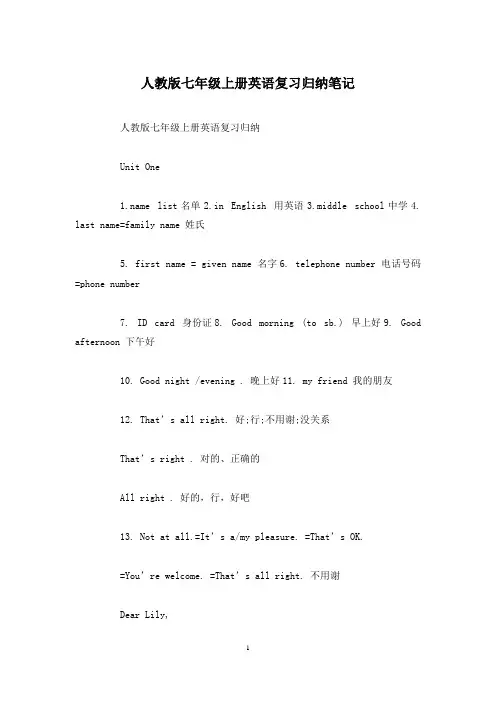
人教版七年级上册英语复习归纳笔记人教版七年级上册英语复习归纳Unit One list名单2.in English 用英语3.middle school中学4. last name=family name 姓氏5. first name = given name 名字6. telephone number 电话号码=phone number7. ID card 身份证8. Good morning (to sb.) 早上好9. Good afternoon 下午好10. Good night /evening . 晚上好11. my friend 我的朋友12. That’s all right. 好;行;不用谢;没关系That’s right . 对的、正确的All right . 好的,行,好吧13. Not at all.=It’s a/my pleasure. =That’s OK.=You’re welcome. =That’s all right. 不用谢Dear Lily,My full name is Kate Brown. Kate is my first name and Brown is my last name. I am a student at No. 7Middle School in Yulin. I am in Class 10,Grade 7, and I am 12 years old now. My favorite color is blue. My telephone number is 184-3546. I have a good friend at school Her name is Mary. Her phone number is 254-3975 What's your telephone number?Can you write and tell me about you?Yours,KateUnit Two1. have a good day 祝你们有愉快的一天2. in the first photo 在第一张照片中3. my cousin我的表(兄弟、姐妹)4. in the next photo 在下一张照片中5. these two girls 这两个女孩6. the name of my dog 我的狗的名字7. my family photo 我的家庭照片 = a photo of my family8. family tree 家谱9. a photo(picture) of …的一张照片Dear Rose,Here is a photo of my family.① There are ten people in my family.② These are my grandparents. And this is my father and that is my mother.③ My parents are teachers.The girl is my sister. Her name is Anna. This boy is my brother, Tom. Those are my uncle and aunt. And that boy is my cousin, Mike.I love my family.④Best wishes!⑤Yours,VeraUnit Three1. pencil box 铅笔盒2. excuse me 打扰,劳驾3. Thank you for your help. 谢谢你的帮助4.Eric’s schoo lbag 艾里克的书包5.in the school library 在学校图书馆6. ask sb for sth 向某人要某物puter game(s) 电脑游戏8. a set of 一副;一套 a set of keys 一串钥匙9. call sb at+电话号码打电话给某人10. school ID card 校卡/学生证Lost:I lost a black notebook on the playground on Jan. 1st.① If you found it, please call me at .②Thank you.③Lucy人教版七年级上册英语复习归纳Unit Four1. under the table 在桌子底下2. in China在中国3. come on 快点4. tape player录音机5. in his schoolbag 在他书包里6. under the bed 在床下7. on the chair 在椅子上8. under the radio 在收音机下面9.in the bookcase 在书柜里10. on the teacher’s desk 在讲台上11. on your head 在你头上12. model plane 飞机模型Look! This is my room.① It's really tidy,② There is④ a desk in my room. On the desk there are④ some books and a computer.And③ my bed is beside the desk.I like my bed very much because it's comfortable②(舒适的).Next to the bed there is a sofa.You can see a dog on the sofa. And its name is Wang wang. My room is not very big,② but③ it's very nice.② What do you think?Unit Five1. tennis ball 网球2. a ping-pong bat 乒乓拍3. at school在学校4. watch TV 看电视5. have /play/do sports 做运动6. a good idea 一个好主意7. watch a game(s) 看比赛/游戏8.That sounds interesting(fun)/good/difficult/ boring/ relaxing. 那听起来很有趣/好/困难/无聊/轻松。
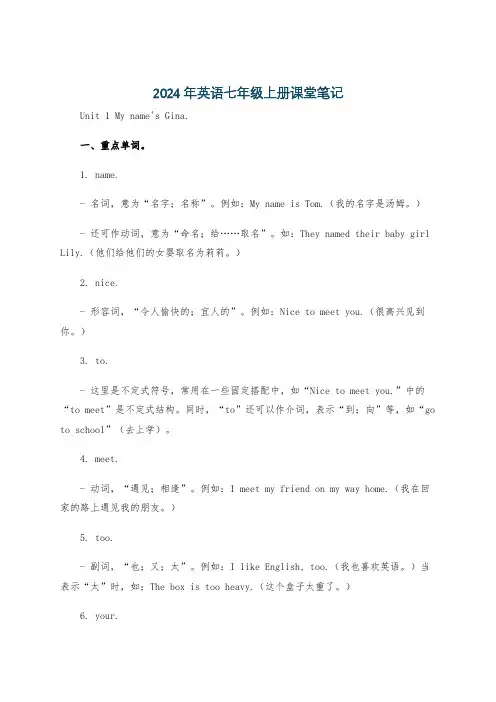
2024年英语七年级上册课堂笔记Unit 1 My name's Gina.一、重点单词。
1. name.- 名词,意为“名字;名称”。
例如:My name is Tom.(我的名字是汤姆。
)- 还可作动词,意为“命名;给……取名”。
如:They named their baby girl Lily.(他们给他们的女婴取名为莉莉。
)2. nice.- 形容词,“令人愉快的;宜人的”。
例如:Nice to meet you.(很高兴见到你。
)3. to.- 这里是不定式符号,常用在一些固定搭配中,如“Nice to meet you.”中的“to meet”是不定式结构。
同时,“to”还可以作介词,表示“到;向”等,如“go to school”(去上学)。
4. meet.- 动词,“遇见;相逢”。
例如:I meet my friend on my way home.(我在回家的路上遇见我的朋友。
)5. too.- 副词,“也;又;太”。
例如:I like English, too.(我也喜欢英语。
)当表示“太”时,如:The box is too heavy.(这个盒子太重了。
)6. your.- 形容词性物主代词,“你的;你们的”。
例如:Your book is on the desk.(你的书在桌子上。
)7. his.- 形容词性物主代词,“他的”。
例如:His name is Jack.(他的名字是杰克。
)8. her.- 形容词性物主代词,“她的”。
例如:Her pen is red.(她的钢笔是红色的。
)二、重点短语。
1. name's = name is.- 例如:My name's Gina. = My name is Gina.(我的名字是吉娜。
)2. nice to meet you.- 用于初次见面时的问候语,回答是“Nice to meet you, too.”(很高兴见到你。
2012最新人教版七年级英语上册各单元知识要点汇总Starter Unit 1 Good morning.1.早上(上午)/下午/晚上好。
Good morning/afternoon/evening.答语也相同。
在熟人或家人之间可省略good。
熟人之间的问候可加上称呼语,称呼语放在问候语之后且用逗号隔开。
如:Good morning , class!同学们,早上好!△Good night!晚安(晚间告别用语)2. Hello, Frank! 你好,弗兰克。
3. A: How are you? 你(身体)好吗?B: (I’m) fine/Very well/I’m OK, Thank you./thanks. How are you? /And you? 我很好,谢谢。
你呢?A: (I’m)fine/OK, too. 我也很好。
4. thanks = thank you 谢谢5. HB(铅笔芯)硬黑CD光盘BBC英国广播公司Starter Unit 2 What’s this in English?1.What’s this/that? 这/那是什么?It’s a/an + 单数物品(△不说This/That is...)1) What’s this/that? 这/那是什么?2) What’s this/that?这/那是什么?It’s a ruler. (这/那是)直尺。
It’s an apple. (这/那是)苹果。
2.What’s this/that in English? 这/那用英语怎么说?It’s a/an + 单数物品(△不说This/That is...)What’s this in English? 这用英语怎么说?It’s a jacket. 夹克衫What’s that in English? 那用英语怎么说?It’s an orange. 橘子。
in + 语言:用某种语言in Chinese/English/Japanese用汉/英/日语英语中还可用What’s the English for….?表达同样的含义。
Starter Unit 11. Morning 指从早晨到中午12点以前的这段时间.Evening 指晚上,通常为黄昏到入睡之间,即晚上6点到12点.Night 指夜里,通常为夜晚或夜里就寝前的一小段时间,即9点以后.Good morning! 早上好!Good afternoon! 下午好!Good night! 晚上好2. How are you? 你好吗?用于熟人之间的问候语,只是一种礼貌的问候方式,用来询问对方的身体状况.回答用”I’m fine , thanks.”How do you do ? 你好吗?用于第一次见面的两个人,互相问候时应用How do you do ?回答也用How do you do ?----How do you do ?----How do you do ?3. Thank you! 谢谢你!当别人帮助,关心,问候,祝福我们时,应用Thank you ;当得到对方的称赞,夸奖时也用Thank you.Starter Unit 21. This 是指示代词,可单独使用,指离说话人较近的人或物.That 指离说话人较远的人或物.2. a/an 为不定冠词常见用法:①表示数量“一”a pen 一支钢笔an apple 一个苹果注:an 用于元音前,元音包括5个:(A E I O U )②泛指某人或某物,不是具体说明A girl is over there. 一个女孩在那边.③在叙述时第一次提到某人或某物She is a teacher. 她是一个老师.3. Spell it , please. 请拼写它.请求对方拼写某一词语的句型还有:① How do you spell it? 你怎么拼写它? 回答可以直接写出:P-E-N.② Can you spell it, please?由can引导的一般疑问句,应先用Yes或No进行肯定或否定回答后,才能拼写. Can you spell it please?Yes, I can. P-E-N.请问你能拼写它吗?是的,我能.P-E-N.Starter Unit 31. What color is it ? 它是什么颜色的?特殊疑问句,用来询问颜色.基本结构:What color + be 动词+主语?当被询问的物品,即句子的主语是单数时,be 动词用is ,回答一般用It’s +颜色.当被询问的物品,即句子的主语是复数时,be 动词用are, 回答一般用They’re +颜色.2. 定冠词the(1)特指双方都明白的人或物Take the medicine.把药吃了.(2)上文提到过的人或事He bought a house.他买了幢房子.I've been to the house.我去过那幢房子.(3)指世界上独一无二的事物the sun,the sky,the moon,the earth(4)单数名词连用表示一类事物the dollar 美元the fox 狐狸或与形容词或分词连用,表示一类人the rich 富人the living 生者(5)用在序数词和形容词最高级,及形容词等前面Where do you live?你住在哪?I live on the second floor.我住在二楼.That's the very thing I've been looking for.那正是我要找的东西. (6)与复数名词连用,指整个群体They are the teachers of this school.(指全体教师)They are teachers of this school.(指部分教师)(7)表示所有,相当于物主代词,用在表示身体部位的名词前She caught me by the arm.她抓住了我的手臂.(8)用在某些有普通名词构成的国家名称,机关团体,阶级等专有名词前the People's Republic of China 中华人民共和国the United States 美国(9)用在表示乐器的名词前She plays the piano.她会弹钢琴.(10)用在姓氏的复数名词之前,表示一家人the Greens 格林一家人(或格林夫妇)(11)用在惯用语中in the day,in the morning...the day before yesterday,the next morning...in the sky...in the dark...in the end...on the whole,by the way...Unit 11. Goals: 掌握由what 引导的特殊疑问句的用法及自我介绍.2. Grammar: be动词(am, is ,are)的用法;特殊疑问句的用法;形容词性物主代词的用法Section A1. name 名字①英语中,姓和名的排列与中国相反,即“先名后姓”,先(first name /given name)后(last name/family name)② Mr、Mrs、Miss、Ms等称呼语只能加在姓氏的前面,不能加在名字前. Ann White----- Miss White③西方国家的女子结婚前随父姓,结婚后随夫姓.Ann White-----Ann Smith(丈夫姓Smith)2. My name’s = My name is 我的名字是.介绍自己名字时较正式的用语I’m =I am 我叫. 比较随意一些.3. 当对方询问What’s your name ? 其答语为“I’m +姓名My name is +姓名”,也可以直接说出名字.4. What’s his/her name? 他/她叫什么名字?用于询问第三方姓名,his表示询问的是男性,her是女性.5. 一些初见时所使用的答语① ---How do you do ? ---How do you do ?② Nice/Glad to see you. 回答用Nice/Glad to see you too.③ How are you? 是熟人之间的问候语回答用----I’m fine.、\I’m OK . \Not bad.\ Just so so . I’m very well. Section B1. What’s your telephone number? 你的电话号码是多少?询问对方电话号码的特殊疑问句,答语可以是----(1)My telephone number is XXXXXX./(2)It’s XXXXXX.(3) XXXXXXGrammar1. be 动词(am, is, are) 的用法be动词包括is, am ,are,相当于汉语中的“是”.我(I)用am, 你(you)用are, is 用于他(he),她(she),它(it).单数名词用is, 复数名词用are.变否定句时,be后要加not.变一般疑问句时,be要往前提. some变anyE.g:I am a girl. 我是一个女孩.You are a boy. 你是一个男孩.He is a boy. 他是一个男孩.She is Mary. 她是Mary.I am not a girl. 我不是一个女孩.Are you a boy? 你是一个男孩吗?2. 特殊疑问句特殊疑问句是由“特殊疑问词+一般疑问句”构成,常用的特殊疑问句有what(什么), when(什么时候), where(哪里), which(哪一个), who(谁)….. What’s your name?Where is the table?3. 形容词性物主代词my(我的), your(你的,你们的), his(他的), her(她的), their(他们的)这些统称为形容词性物主代词1. 放在被修饰的名词前.my pen 我的钢笔(My为物主代词,pen为被修饰词)2. 不能与冠词(a, an, the)等连用修饰名词This is my pen. 不能说This is my a pen.3. 如果名词前还有其他形容词修饰,形容词性物主代词要放在所有形容词的最前面. my red pen4.变否定句在be动词后面直接加not,some变anyThis is my pen变为This is not my penThey are some books 变为They are not any booksUnit 2Section A1. Excuse me. 请原谅,打扰一下.作为与陌生人开始谈话或打扰别人时所听到的礼貌用语.Section B1. call sb. 给某人打电话call + 某人电话拨打…..号码call sb. at +电话号码拨打电话号码找某人2. a set of 一套,一串后接复数名词A set of keys 一串钥匙Grammar一般疑问句1. 当询问情况是否属实或需要对方做出肯定或否定回答时2. 由be动词引导This is a pen.→Is this a pen?3. 陈述句变为一般疑问句(1)把be 动词提到句首This is a pen.→Is this a pen?(2)如果原主语是第一人称,应把第一人称变为第二人称.This is my pen.→Is this your pen?(3)句末加问号.(4)some 变anyYou have some books变为:Do you have any books?4. 回答有肯定回答和否定回答两种.肯定回答:Yes, 主语+be( am , is , are)否定回答:No, 主语+be(am, is ,are)+ not---Is he your father?---Yes, he is./No, he isn’nt.。
七年级上册英语书知识点笔记一、Unit 1 My name's Gina.1. 重点单词。
- name名字;nice令人愉快的;to常用于原形动词前,表示该动词为不定式;meet遇见;too也;your你的;他的(your是形容词性物主代词,后面要接名词);his他的;her她的。
2. 重点句型。
- What's your name? My name's Gina.(询问对方名字及回答)- Nice to meet you. Nice to meet you, too.(初次见面的问候语)- His name's Dale. Her name's Mary.(介绍他人名字,注意使用形容词性物主代词)3. 语法知识点。
- 形容词性物主代词:my(我的)、your(你的/你们的)、his(他的)、her (她的)。
它们在句中不能单独使用,后面必须接名词,例如:my book(我的书),her pen(她的钢笔)。
二、Unit 2 This is my sister.1. 重点单词。
- sister姐妹;brother兄弟;father父亲;mother母亲;parent父(母)亲;grandmother(外)祖母;grandfather(外)祖父;grandparent(外)祖父母;family家;家庭;those那些;these这些;they他(她、它)们。
2. 重点句型。
- This is my sister.(介绍某人,用this is...结构)- These are my brothers.(this的复数形式是these,is的复数形式是are,用于介绍复数的人或物)- That's my father. Those are my grandparents.(that的复数形式是those)- Who's he? He's my brother.(询问某人是谁及回答)- Are those your parents? Yes, they are.(一般疑问句及其回答,注意主语是复数时,be动词用are,回答时用人称代词they)3. 语法知识点。
七上英语2024新版教材笔记人教版七年级上册英语2024新版教材笔记。
一、预备篇。
1. 字母。
- 26个英文字母的大小写书写规范。
大写字母占上两格,如A、B、C等;小写字母有的占一格(如a、c、e等),有的占两格(如b、d、h等),还有的占三格(如f、j等)。
- 字母的读音,注意元音字母(a、e、i、o、u)和辅音字母的发音区别。
例如,元音字母在开音节和闭音节中的发音不同。
2. 简单的问候语和自我介绍。
- Hello/Hi:用于熟人或陌生人之间的简单问候,比较随意。
- Good morning/afternoon/evening:根据不同的时间段使用,分别是早上、下午、晚上的问候语,较为正式。
- 自我介绍:“I'm...”(I am的缩写形式),后面接自己的名字,例如“I'm Tom.”二、Unit 1 My name's Gina.1. 重点单词。
- name:名字,可用于询问他人名字,如“What's your name?”- to:在这里是不定式符号,在“Nice to meet you.”中无实际意义。
- meet:遇见,相逢。
- too:也,用于句末,如“I'm fine, too.”- your:你的,你们的,是形容词性物主代词,后面要接名词,如“your name”。
- his:他的;her:她的,这两个也是形容词性物主代词。
2. 重点句型。
- What's your name?- 回答:“My name's...”或者“I'm...”。
- Nice to meet you.- 回答:“Nice to meet you, too.”- Is he/she...?- 回答:“Yes, he/she is.”或者“No, he/she isn't.”例如“Is he Tom? Yes, he is.”三、Unit 2 This is my sister.1. 重点单词。
七年级上册英语书人教版笔记一、Starter Units 1 - 3。
1. Greetings and Introductions.- Hello/Hi: Casual greetings.- Good morning/afternoon/evening: Used at different times of the day.- How are you?- Fine, thank you. And you? (A common response and a follow - up question.)- Nice to meet you. / Nice to meet you, too. (For introductions)2. Alphabet.- There are 26 letters in the English alphabet.- Vowels: a, e, i, o, u. The rest are consonants.- We can practice writing and pronouncing the letters. For example, the letter “a” can be pronounced as /eɪ/ in “cake” and /æ/ in “cat”.3. Basic Words for Things Around Us.- Colors: red, blue, green, yellow, black, white, etc.- Numbers: one, two, three, four, five, six, seven, eight, nine, ten.二、Unit 1 My name's Gina.1. Names and Identity.- I'm... / My name is...: Ways to introduce oneself. For example, “I'm Tom. My name is Thomas.”- Nice to meet you. Nice to meet you, too.: Used when meeting new people.- What's your name? (A common question to ask someone's name)- His/Her name is...: To talk about someone else's name. For example, “His name is Jack. Her name is Lily.”2. Grammar - Be Verb (am/is/are)- I am (I'm): First person singular.- He/She/It is (He's/She's/It's): Third person singular.- You/We/They are (You're/We're/They're): Second person, first person plural and third person plural.三、Unit 2 This is my sister.1. Family Members.- father/dad, mother/mom, sister, brother, grandfather/grandpa, grandmother/grandma, aunt, uncle, cousin.- This is... / That is...: Used to introduce family members or people. For example, “This is my sister. That is my brother.”- These are... / Those are...: For plural introductions. For example, “These are my parents. Those are my cousins.”2. Possessive Adjectives.- my, your, his, her, its, our, their.- We use possessive adjectives to show ownership. For example, “This is my book. His pen is blue.”四、Unit 3 Is this your pencil?1. School Things.- pencil, pen, book, eraser, ruler, schoolbag, dictionary etc.- Is this/that...? (Yes, it is. / No, it isn't.) For singular items. For example, “Is this your pencil? Yes, it is.”- Are these/those...? (Yes, they are. / No, they aren't.) For plural items. For example, “Are these your books? No, they aren't.”2. Lost and Found.- When we find something, we can say “I found a...”. For example, “I found a pen.”- If we lose something, we can ask “Did you see my...?” For example, “Did you see my schoolbag?”五、Unit 4 Where's my schoolbag?1. Prepositions of Place.- in, on, under, behind, in front of, next to.- For example, “The book is in the schoolbag. The pen is on the desk. The eraser is under the chair.”- Where is...? / Where are...? (Questions about location)- For example, “Where is my book? Where are my pencils?”2. Room and Furniture.- room, desk, chair, bed, bookcase, sofa etc.- We can describe the position of furniture in a room using prepositions of place. For example, “The desk is next to the bed.”六、Unit 5 Do you have a soccer ball?1. Sports and Hobbies.- soccer, basketball, tennis, ping - pong, volleyball etc.- Do you have...? (Yes, I do. / No, I don't.) For example, “Do you have a soccer ball? Yes, I do.”- Let's...: A way to suggest doing something. For example, “Let's play basketball.”2. Verb “have”- I/You/We/They have...- He/She/It has... For example, “He has a tennis racket.”七、Unit 6 Do you like bananas?1. Food and Drinks.- banana, apple, orange, strawberry, hamburger, tomato, ice - cream, milk, bread etc.- Do you like...? (Yes, I do. / No, I don't.) For example, “Do youlike bananas? Yes, I do.”- I like... / I don't like...: To express preferences. For example, “I like apples. I don't like tomatoes.”2. Countable and Uncountable Nouns.- Countable nouns: banana, apple (We can use numbers with them, like “one banana, two apples”).- Uncountable nouns: milk, bread (We usually don't use numbers directly with them. We can say “a glass of milk, a piece of bread”).八、Unit 7 How much are these socks?1. Shopping.- sock, T - shirt, shorts, sweater, trousers, shoe, skirt etc.- How much is...? (It's... dollars.) For singular items. For example, “How much is this T - shirt? It's ten dollars.”- How much are...? (They're... dollars.) For plural items. For example, “How much are these socks? They're five dollars.”- Can I help you? (A common question in a store)2. Prices and Numbers.- We need to know numbers well to talk about prices. For example, “fifteen, twenty, thirty” etc.九、Unit 8 When is your birthday?1. Dates and Birthdays.- January, February, March, April, May, June, July, August, September, October, November, December.- When is your birthday? (My birthday is in.../on... ) For example, “My birthday is in May.”- on + 具体日期: For example, “My birthday is on May 1st.”2. Ordinal Numbers.- first (1st), second (2nd), third (3rd), fourth (4th), fifth (5th) etc.- We use ordinal numbers to talk about the order of things, like the date of a birthday.十、Unit 9 My favorite subject is science.1. School Subjects.- science, math, English, Chinese, history, geography, art, music, P.E.- My favorite subject is...: To talk about the subject one likes the most. For example, “My favorite subject is science.”- Why do you like...? (Because... ) For example, “Why do you like English? Because it's interesting.”2. Adjectives for Describing Subjects.- interesting, boring, difficult, easy etc. For example, “Science is interesting. Math can be difficult.”。
初一上册英语笔记人教版一、Starter Units 1 - 3。
1. 字母。
- 26个英文字母的大小写书写规范。
大写字母占上两格,如A、B、C等;小写字母有些占一格(如a、c、e等),有些占两格(如b、d、h等),有些占三格(如f、j等)。
- 字母的读音:要注意元音字母(a, e, i, o, u)和辅音字母的发音区别。
例如,a在开音节中发[ei],在闭音节中发[æ]。
2. 简单的问候语和自我介绍。
- 问候语。
- Good morning/afternoon/evening.(分别用于早上、下午、晚上的问候)- How are you?(回答可以是I'm fine, thank you. And you?)- 自我介绍。
- I'm...(后面接自己的名字)- My name's...(name's是name is的缩写形式)3. 颜色词汇。
- red(红色)、blue(蓝色)、green(绿色)、yellow(黄色)、black(黑色)、white(白色)、purple(紫色)、orange(橙色)等。
- 例如:The pen is red.(描述物品的颜色)4. 数字1 - 9。
- one、two、three、four、five、six、seven、eight、nine。
- 可以用于描述数量,如I have two pens.二、Unit 1 My name's Gina.1. 重点单词。
- name名字;nice令人愉快的;to常用于动词原形前,表示“向;朝;至;达”;meet遇见;too也;your你的;你们的;his他的;her她的。
- 例如:Nice to meet you.(很高兴见到你)2. 形容词性物主代词。
- my(我的)、your(你的/你们的)、his(他的)、her(她的)。
- 用法:形容词性物主代词后面要接名词。
例如:This is my book.(不能说This is me book)3. 名字的表达。
2012最新人教版七年级英语上册各单元知识要点汇总Starter Unit 1 Good morning.1.早上(上午)/下午/晚上好。
Goodmorning/afternoon/evening.答语也相同。
在熟人或家人之间可省略good。
熟人之间的问候可加上称呼语,称呼语放在问候语之后且用逗号隔开。
如:Good morning , class!同学们,早上好!△Good night!晚安(晚间告别用语)2. Hello, Frank! 你好,弗兰克。
3. A: How are you? 你(身体)好吗?B: (I’m) fine/Very well/I’m OK, Thank you./thanks. How are you? / And you?我很好,谢谢。
你呢?A: (I’m)fine/OK, too. 我也很好。
4. thanks = thank you 谢谢5. HB(铅笔芯)硬黑CD光盘BBC英国广播公司Starter Unit 2 What’s this in Eng lish?1.What’s this/that? 这/那是什么?It’s a/an + 单数物品(△不说This/That is...)1) What’s this/that? 这/那是什么?2) What’s this/that? 这/那是什么?It’s a ruler. (这/那是)直尺。
It’s an apple. (这/那是)苹果。
2.What’s this/that in English? 这/那用英语怎么说?It’s a/an + 单数物品(△不说This/That is...)What’s this in English? 这用英语怎么说?It’s a jacket. 夹克衫What’s that in English? 那用英语怎么说?It’s an orange. 橘子。
in + 语言:用某种语言in Chinese/English/Japanese用汉/英/日语英语中还可用What’s the English for….?表达同样的含义。
What’s the Eng lish for直尺?直尺用英语怎么说?It’s a ruler.是ruler3. a和an是不定冠词,只用在可数名词单数前面,表示“一”。
a用在以辅音音素开头的单词前;an用在以元音音素开头的单词前。
这里的元音音素和辅音音素是指读音,而不是指字母。
如:a pen /pen/ 一支钢笔 (/p/为辅音音素)an orange /’ ɒrindʒ / 一个桔子(/ɒ /为元音音素)4. P停车场;停车位NBA(美国)全国篮球协会kg千克;公斤5.Spell it, please. = Please spell it. 请拼读它。
K – E - Y.Spell “pen”, please. = Please spell pen. 请拼读“pen”。
P – E - N.注:please置于句末时,前面要加逗号。
Starter Unit 3 What color is it?1.What’s this/that? 这/那是什么?It’s V. 这是V。
V是字母,是专有名词,前面不必加冠词,但表示某一类东西,则在其单数名词前加a或an。
1) What’s this/that? 这/那是什么?2) What’s this/that? 这/那是什么?It’s a ruler. (这/那是)直尺。
It’s an apple. (这/那是)苹果。
2.问颜色:What color1) What color is + 单数名词?2) What color are + 复数名词?It’s /It is + 颜色. They’re/They are + 颜色.如1) What color is the key?(这把)钥匙是什么颜色的?It’s (It is)yellow. (它是)黄色的。
2) What color are the keys? 这些钥匙是什么颜色的?They’re (They are) red.. (它们)是红色的。
3.color 1) n.颜色2) v. 给......着色,把......染成某种颜色color sth + 颜色:把某物涂成……颜色Color the pencil red. 把铅笔涂成红色。
4.It’s black and white. 它是黑白色的。
5.S 小号的M 中号的L 大号的UFO 不明飞行物CCTV 中国中央电视台UN 联合国6. The key is yellow. 钥匙是黄色的。
The是定冠词,表示“这(个),那(个),这些,那些” ,在元音音素前读/ ði: /,在辅音音素前读/ð ə/。
它可以用在名词前,表示特指说话双方都知道的人或物,或上文提到的人或物。
1) The book on the desk is mine. 桌子上的书是我的。
(特指)2) Where is the teacher? 老师在哪?(双方都知道)3) He has a pen, the pen is black.他有支钢笔,钢笔是黑色的。
(指上文提到的事物)知识要点一1. 七年级字母教学资料1)英语中共有26个字母。
其中的Aa,Ee,Ii,Oo,Uu5个字母被称为元音字母。
这五个元音字母是构成英语成千上万单词的核心,除了一些缩略词之外,其它任何一个英语单词,通常都应包含一个或多个元音字母。
26个字母中的其它21个字母被称为辅音字母。
2)字母书写的规格①斜度:每个字母都要稍向右斜约10°左右,斜度要一致。
②大写字母的书写规格是:上不顶天下立地。
即笔画的上端稍离第一线,笔画的下端必须紧贴第三线,不许离线也不许出格。
③占中间格的小写字母有a, c, e, m, n, o, r, s, u, v, w, x, z13个,它们笔画的上端必须紧贴第二线,下端必须紧贴第三线,不许离线也不许出格。
④占一格、二格的小写字母有b, d, h, k, l共5个,它们笔画的上端必须顶第一线,下端必须顶第三线,不许离线也不许出格。
⑤小写字母i和t也占一格、二格。
但t的上端在第一格中间,短横重合第二线;i的小圆点在第一格中间稍偏下处。
⑥占二格、三格的小写字母有g, q, y3个,它们的笔画的顶端要紧贴第二线,下端要紧贴第四线,不可离线也不可出格。
⑦占一格、二格、三格的小写字母有f, j, p3个。
其中f的上端稍离第一线(和大写字母一样),下端紧贴第四线,短横重合第二线;j的小圆点与i的小圆点位置相同,下面一笔的上端顶第二线,下端紧贴第四线;p的上端略高于第二线,约占第一格的三分之一,下端紧贴第四线。
⑧字母按所含音素归类表:/ei / 字母: Aa Hh Jj Kk音标: /ei / /e t∫ / /dʒe / /ke//i:/ 字母: Bb Cc Dd Ee Gg Pp TtV音标: /bi:/ /si:/ /di:/ /i:/ /dʒi:/ /pi:/ /ti://vi://ɑi/字母: Ii Yy音标: /ɑ/ /wɑ // əʊ /Oo /əʊ // ju: / 字母: Uu Qq Ww音标: /ju:/ /kju:/ /`dΛblju://ɑ: /Rr /ɑ: //e/ 字母: Ff Ll Mm Nn Ss Xx Zz音标: /ef/ /el/ /em/ /en/ /es/ /eks//zed/2.缩写词: HK香港ID身份 PE体育课 PRC 中华人民共和国 RMB 人民币PLA中国人民解放军CCP中国共产党 IOC国际奥林匹克委员会am 上午pm下午 cm厘米 mm毫米3.英语句子的书写句子开头的第一个单词的第一个字母要大写,单词与单词之间要有适当的距离,一般为放入一个字母的空隙,句末要有标点符号,英语的句号是个实心圆点,而不是汉语中的小圆圈。
4.大写字母的用法1)英语句子开头的第一个字母必须大写。
2)I(我),OK在句中任何位置都大写。
3)人名、地名、国名、某国人或某种语言等专有名词的第一个字母必须大写。
4)电影名、书名、报刊、文章的标题等中的每个实词(如:名词、动词、形容词、副词、数词)的第一个字母一般大写。
EnglishWeekly《英语周报》Titanic《泰坦尼克号》5)表示月份、星期、重要节日的名词的第一个字母必须大写。
6)某些缩略词的第一个字母都必须大写。
7)表示称呼的名词的第一个字母通常要大写。
Uncle Wang王叔叔6.英语句子成分:组成句子的各个部分即句子成分。
句子成分包括:主语、谓语、宾语、表语、定语、状语、补足语等。
一、主语(subject): 句子说明的人或事物。
1.The sun rises in the east.太阳从东方升起。
(名词)2.He likes dancing.他喜欢跳舞。
(代词)3.Twenty years is a short time in history.二十年在历史中是个很短的时间。
(数词)4.Seeing is believing.眼见为实。
(动名词)5.To see is to believe. 眼见为实。
(不定式)6.What he needs is a book. 他所需要的是本书(主语从句)二、谓语(predicate): 说明主语的动作、状态和特征。
1.We study English. 我们学习英语2. He is asleep. 他睡着了。
三、表语(predicative):表示主语“是什么”或者“怎么样”,表语前面的动词称为系动词。
1. He is a teacher.他是个老师(名词2. Five and five is ten.五加五等于十(数词)3.He is asleep.他睡着了(形容词)4.His father is in. 他的父亲在家(副词)5.The picture is on the wall.画在墙上。
(介词短语)6.That sounds good 那听起来很好。
7.Tom looks thin. 汤姆看上去很瘦。
常见的系动词有: be, sound(听起来), look(看起来), feel(摸起来,smell(闻起来),taste(尝起来、吃起来), feel(感觉) ...四、宾语:动作、行为的对象1.I like China.我喜欢中国。
(名词)2.You can help me. 你能帮助我。
(代词)3.How many do you need? We need two. 你们需要多少?我们需要两个。
(数词)4. I like playing soccer. 我喜欢踢足球。